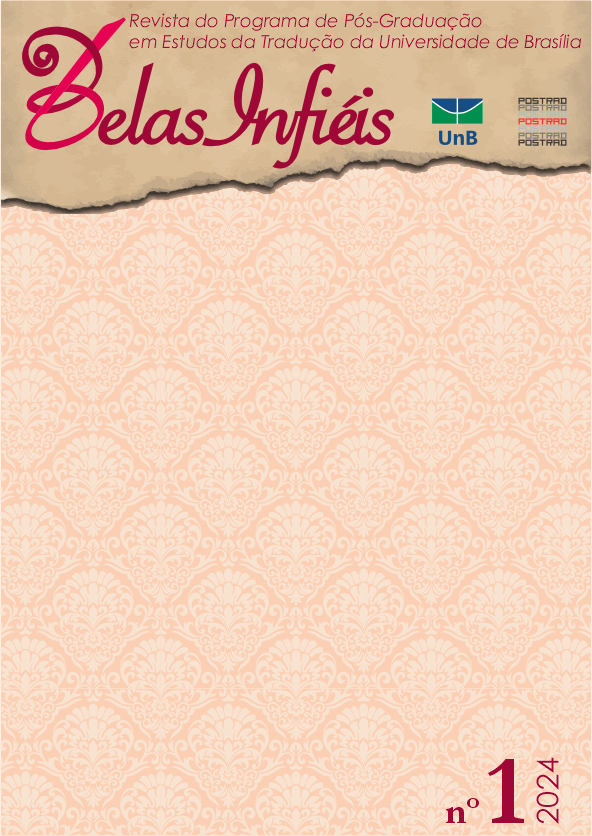L'importance de la recherche collaborative dans la pédagogie de la traduction
DOI :
https://doi.org/10.26512/belasinfieis.v13.n1.2024.55925Mots-clés :
Recherche collaborative. Recherche dans la salle de classe. Enseignement de la traduction. Performance magistrale. Formation des formateurs.Résumé
Au cours des vingt dernières années, des auteurs tels que Delisle (1988) et Kiraly (2000) se sont inquiétés de l’absence d’un consensus quant aux méthodes d’enseignement des cours pratiques de traduction. Dans cet article, nous faisons premièrement une révision du concept de communauté en traductologie et deuxièmement, nous nous faisons l’écho des critiques de Delisle quant au manque d’innovation en méthodologie de l’enseignement dans les cours pratiques de traduction. Troisièmement, nous offrons deux exemples de recherches qui peuvent être menées au sein des cours. Ce sont des initiatives pour encourager la recherche collaborative en traduction et surtout pour insister sur l’importance de la salle de classe comme le lieu par excellence de la production des données empiriques sur lesquelles fonder une méthodologie de l’enseignement de la traduction.
Références
Baer, B. and Koby, G. (Eds.) (2003). Beyond the ivory tower: Rethinking translation pedagogy, Amsterdam/Philadelphia, John Benjamins.
Bachelard, G. (1969). La formation de l'esprit scientifique : Contribution à une psychanalyse de la connaissance objective, Paris, Librairie philosophique J.Vrin.
Chesterman, A. (2000). What constitutes “progress” in Translation Studies? in Birgitta Englund Dimitrova (ed.), Översättning och tolkning. Rapport från ASLA: shöstsymposium, Stockholm, 5-6 november 1998, Uppsala, ASLA, pp. 33-49.
Colina, S. (2003). Translation teaching from research to the classroom, New York/SanFrancisco, McGraw-Hill.
Delisle, J. (1988). "L'initiation à la traduction économique". Meta 33(2), pp. 204-215.
Des Marchais, J. (1996). Apprendre à devenir médecin : Bilan d’un changement pédagogique centré sur étudiant, Sherbrooke (Québec), Presses de l’Université de Sherbrooke.
Holmes, J. (2000). "The Name and Nature of Translation Studies", in Lawrence Venuti (ed.), Translation Studies Reader, London/New York, Routledge, pp. 172-185.
Kiraly, D. (2000). A Social constructivist approach to translator education. Manchester, UK & Northampton, MA, St. Jerome Publishing.
Ladmiral, J.-R. (1977). « La traduction dans le cadre de l’institution pédagogique », Die Neueren Sprachen 76, pp. 489-516.
Rogers, C. (1976). Liberté pour apprendre (Daniel Le Bon, Trad.), Paris, Dunod.
Shreve, G. (1998). Keynote Address: Language in Business / Language as Business Conference Institute for Applied Linguistics, Kent State University, Kent, Ohio. October 8, 1998. En línea: http://appling.kent.edu/ResourcePages/ConferencesandWorkshopsPast/LanguageinBusiness/Thurs day/01-Shreve.PDF página consultada março 2003.
Toury, G. (1995). Descriptive translation studies - and beyond, Amsterdam/Philadelphia, John Benjamins.
Téléchargements
Publié
Numéro
Rubrique
Licence
© CC BY 2024

Cette œuvre est sous licence Creative Commons Attribution 4.0 International.
Copyright Statement
Given the public access to this journal, the texts are free to use but requires the recognition of the original authorship and initial publication in this journal to be properly stated.
The journal allows the use of works published for non-commercial purposes, including the right to submit the work to publicly accessible databases. Published contributions are the sole and exclusive responsibility of the author(s).
- When submitting papers to be evaluated by the Belas Infiéis journal, the author(s):
- Declare that the contents of the contributions are original and of their original creation, being entirely responsible for their content if there is an objection by third parties.
- Claim to be aware that they should not commit academic plagiarism.
- Declare that the manuscript has not been published, completely or partially, in Portuguese or another language. If it is a translation it should be submitted to the Translated Articles section.
- Declare that the manuscript is not being evaluated by other journals.
- Declare that the manuscript was not submitted to another journal simultaneously.
- Commit(s) to inform the journal of any kind of error or inaccuracy in their contribution (published, in evaluation or in editing) and to collaborate with the editors to make due corrections of the article (when in evaluation or editing) or erratum/retraction (after publication).
- Declare that there is no conflict of interest regarding the published work.
- Authorize its release if it is accepted for publication without any kind of monetary compensation.
- Agree to assign non-exclusive rights to publication to the magazine, remaining free to make their contribution available in other media as long as the publication of the first version in Belas Infiéis magazine is mentioned. They also authorize Belas Infiéis to assign their texts for reproduction in content indexers, virtual libraries and similar platforms.
- Maintain copyright and grant the journal the right of first publication, the work being licensed under theCreative Commons Attribution License.
- Is/Are allowed and encouraged to publish and distribute their work online after the editorial process, which may increase the impact and citation of the published work.
- Authorize the editorial team to make textual adjustments and to adapt the article to the publication rules, when necessary.



















